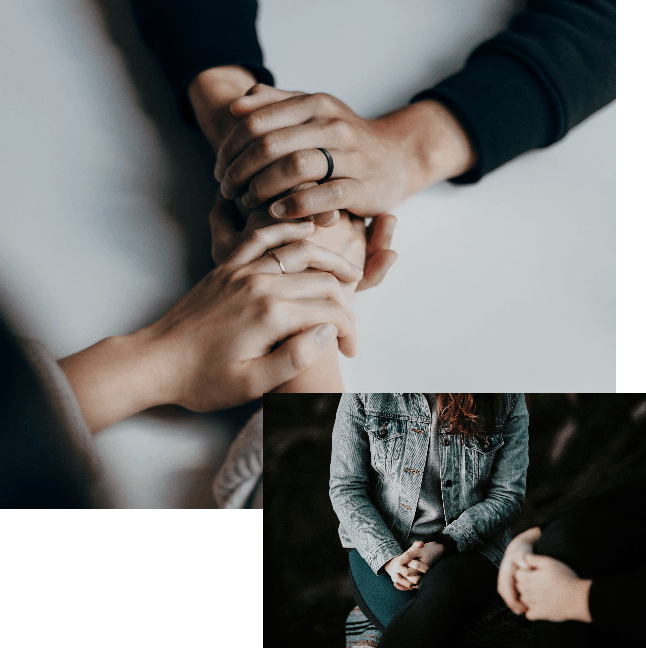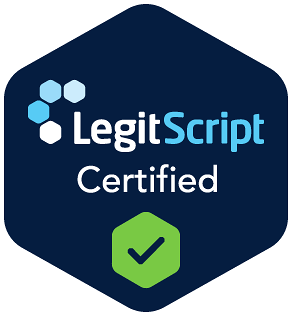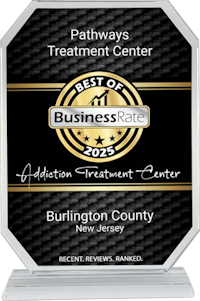Intensive Outpatient Treatment in Burlington, New Jersey
Our Intensive Outpatient Program (IOP) provides comprehensive therapy and support while allowing each person to maintain their daily responsibilities, and is designed to support each person’s unique recovery needs.
Before starting an IOP, an initial assessment is conducted to determine the best treatment plan for you. Our IOP serves adults and young adults seeking flexible addiction recovery care. Explore our Intensive Outpatient Program in NJ to learn how this type of treatment can help you overcome addiction and strengthen your mental health.
What Is an Intensive Outpatient Treatment Program?
An intensive outpatient program (IOP) is a flexible treatment option that’s designed to take on both addiction and mental illness. Our program is tailored to different age groups, including adults and young adults, to address age-related needs in care. It also provides a flexible way of maintaining their daily commitments to work and family. The goal of our IOP is to provide support and education to individuals in order to maintain sobriety. We address addictions to alcohol and drugs, as well as the underlying issues, such as mental health conditions, that may lead to addiction so you can resolve and learn to manage any triggers.

How Can Intensive Outpatient Treatment Help You?
Intensive outpatient treatment can help treat a variety of issues, but is commonly used to treat these disorders:
These programs also address general mood and anxiety disorders, providing comprehensive care for a range of mental health needs. This type of treatment can also help you transition from a residential program back to your normal life.
IOPs offer support and help continue the development of new coping skills, which helps prevent relapse. Integrated substance abuse treatment services are also available, ensuring support for individuals with co-occurring disorders.

Why Should You Choose an IOP?
You might choose an IOP if you need flexibility in your treatment, but also require intensive care. Treatment plans are determined based on your individual needs and therapist recommendations, ensuring a personalized approach. IOPs offer more structure than a traditional outpatient program but are less intense than a Partial Hospitalization Program (PHP). Another reason people choose this type of treatment program is that it’s less expensive than residential or inpatient treatment programs while still providing a high level of care.
The IOP schedule is designed to accommodate work, school, and family commitments. While in an IOP, you stay in your own home as opposed to a residential treatment program where you would live in a facility for the duration of treatment. Being able to return home after the treatment may make it easier to integrate the skills you learn into your day-to-day life and activity.
Stages of Addiction Treatment
There are five stages to addiction treatment, which apply to individuals with various addictions. IOPs are classified as Level 2 treatment, between outpatient treatment (which is less intense) and partial hospitalization (which requires long hours of treatment). The other stages include inpatient treatment and detoxification.
- Level 1: Outpatient treatment that includes weekly therapy sessions and medication management in some cases.
- Level 3: PHP offers a combination of individual and group therapy, as well as medication if needed. Participants can go home at night but are in treatment for the entire day.
- Level 4: Inpatient treatment provides 24/7 care so participants live in the treatment facility.
- Level 5: Detoxification, the initial stage of addiction treatment, is the most intensive level of care you can receive for addiction treatment.
As participants progress through these stages, they work to move past previous barriers to recovery, overcoming challenges from the past to achieve lasting wellbeing.
Mental Health and Addiction Treatment
At Pathways Treatment Center, we recognize that mental health and addiction treatment go hand in hand. Many individuals facing substance use disorders are also dealing with underlying mental health disorders, such as depression, anxiety, or bipolar disorder. Our intensive outpatient program (IOP) is designed to address both mental health and addiction challenges simultaneously, providing a comprehensive approach to healing and recovery.
Our team of experienced addiction counselors and mental health professionals collaborates to create personalized treatment plans for each individual. We understand that every person’s journey is unique, and our intensive outpatient programs are tailored to meet your specific needs, circumstances, and goals. Through a combination of evidence-based therapies and compassionate support, our IOP helps individuals work through the complexities of mental illness and substance use, empowering them to achieve lasting well-being.
Whether you are struggling with a mental illness, substance use disorder, or both, our intensive outpatient program offers a supportive environment where you can focus on recovery, develop healthy coping skills, and build a foundation for a healthier future. At Pathways, we are committed to helping you overcome challenges and reclaim your life.
What To Expect from IOP in New Jersey
You can expect to visit a treatment facility three to four times a week if you choose an IOP. Your treatment sessions will include therapy sessions to teach you about relapse prevention, stress management, and how to develop positive thought and behavior patterns. Therapy addresses both the physical and emotional aspects of recovery, ensuring a comprehensive approach to your well-being. A psychiatrist may be involved in your treatment team to assist with medication management if needed. Therapy is both individual and in groups, helping you deal with the challenges of recovery. This helps build a support system and practice the skills you’ll learn in each setting.
Group Therapy
During group therapy, a licensed professional guides a group to discuss topics such as skill development, psychoeducation, refusal training, and relapse prevention. Group therapy is a core form of treatment in intensive outpatient programs as well as in residential programs. It offers several advantages, especially for social skills, making it unique when compared to other methods of treatment.
In group therapy, you’ll interact with peers, learning how to build healthy relationships and make connections with others who are dedicated to recovery. These new relationships are instrumental in maintaining your sobriety and sticking to recovery goals.
Individual Therapy
In individual therapy, you work with a counselor one-on-one. Since group therapy is often the core of an IOP, you may build on the progress you’re making in group sessions. For example, in individual therapy sessions, you may continue to work on relapse prevention techniques that you learn with a group. This type of treatment also includes cognitive-behavioral therapy (CBT).
Your counselor will discuss your personal struggles and provide you with coping techniques. If you’re taking any medication for your treatment, your therapist will help manage this by adjusting the dosage and taking note of how it’s affecting you. Many people continue individual therapy even after completing intensive outpatient therapy because maintaining a relationship with your therapist can help maintain your recovery.
Outpatient Program Options
We offer a range of outpatient program options to support individuals at every stage of their recovery journey. Our intensive outpatient program (IOP) is a structured and supportive treatment option that typically involves at least nine hours of therapy per week, with sessions scheduled three to five days per week. This level of care is ideal for those who need more support than traditional outpatient therapy but do not require the round-the-clock supervision of inpatient care.
For those who have completed our IOP or require less intensive care, we also offer a general outpatient program. This option provides ongoing support and therapy to help you maintain your progress and continue managing your mental health and addiction challenges. Our outpatient programs are designed to be flexible, allowing you to maintain your daily routine, work, or school commitments while receiving the care and support you need to thrive.
Support for Loved Ones
At Pathways Treatment Center, we understand that recovery is not just an individual journey; it’s a process that involves and impacts loved ones as well. That’s why we offer dedicated support services for family members and friends. Our family therapy program creates a safe space for loved ones to learn about mental health and addiction, understand the recovery process, and develop effective ways to support their family member or friend.
In addition to family therapy, we provide individual therapy and support groups specifically for loved ones. These services offer a supportive environment to process emotions, share experiences, and connect with others facing similar challenges. Our goal is to equip loved ones with the skills, resources, and understanding they need to maintain their own well-being while supporting the recovery of someone they care about.
By involving loved ones in the treatment process and family therapy sessions, we help strengthen relationships, improve communication, and foster a network of support that is essential for long-term recovery. At Pathways, we are committed to supporting not only our patients but also the people who care about them most.
How Long is an Intensive Outpatient Treatment?
You can typically complete an IOP in 12 to 16 weeks. At Pathways, individuals attend treatment for at least nine hours per week. You may have three to four sessions per week that last for three hours. Your treatment can be extended if needed. Our treatment center enables you to customize treatment to your specific needs.
Choosing the Best Addiction Treatment For You
Learning about the types of treatments available for addiction, including those for alcohol and drugs, will help you choose the best option for yourself. Your physicians or counselors can make recommendations and help you determine what will be most effective for you through an initial assessment, which helps identify your specific needs and informs your personalized treatment plan.
When choosing a treatment program, it is important to consider any co-occurring mental health conditions, as integrated care can address both addiction and mental health needs. For addiction recovery, it’s important to seek treatment from a facility that customizes its approach for you so that you receive treatment based on a plan, tailored to your addiction case. Social support is also a component of recovery you should look for when seeking treatment. It’s also helpful to choose a facility with ongoing treatment so that you can transition and adjust your treatment as you make progress toward recovery.
Contact Pathways Treatment Center To Learn More
At Pathways Treatment Center we offer customized outpatient treatment for each of our guests. We’ll develop a treatment plan with the level of care you need to achieve lifelong recovery from addiction. With our team of dedicated and experienced addiction treatment professionals, you will learn specific techniques and tools to help you overcome your addiction.
Call us today about our intensive outpatient treatment in Burlington, New Jersey. If you’ve been struggling with substance abuse, help is just a call away.



